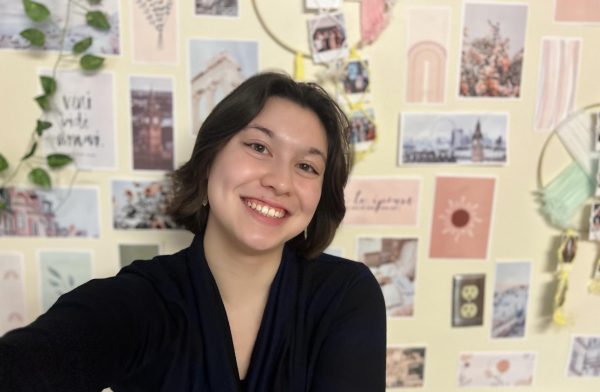On Tuesday through Friday of sixth week, the classics department collaborated with Bon Appétit to create meals during lunch from the ancient world, inspired by Ancient Roman writer Apuleius’ novel, “The Golden Ass.”
Classics Professor Jake Morton leads this collaboration, creating his own menu every term.
“They give me a station once a term, and I work with other departments. Sometimes it’s my own thing,” said Morton. “In Spring Term, I’ll look at what I’m teaching and see if I can tie anything into that, and also ask around in my department and in Archeology, MARS or Arabic about their courses.”
This term’s menu came from the novel “The Golden Ass,” which is currently being taught by Classics Professor Chico Zimmerman in his class “Expectasne Patronum? Magical Practice in the Greco-Roman World.”
“The novel that we have from [Apuleius] is the only complete novel that we have in Latin, and it’s based on a Greek precedent,” said Zimmerman. “It’s the story of a young man [Lucius] who, because he’s interested in magic, runs himself afoul of a witch and gets himself turned into a donkey. And he has to spend a long time as a donkey before he gets turned back.”
Zimmerman has found this week helpful in that it provided another opportunity for students to gain a deeper understanding of the text.
“My students are actually right in the middle of the novel, so the timing of this week was great because it both looked ahead to what we’ll be discussing in class in a couple of weeks, and what we’ve just discussed in class this week,” said Zimmerman. “We used it very much as a way to inhabit the text.”
Morton’s comments followed a similar vein, citing education as one of his goals for these collaborations: “There’s a hidden education in [the dishes] in that I did all this research on the recipes, so just by eating it, you’re learning something.” He said, “If you got that plate of food, and you’re comparing it to what’s normally at that station, you’re learning something.”
“The Golden Ass” menu highlighted four dishes corresponding to four key plot points in the novel: Lucius’ seduction, Cupid and Psyche’s wedding feast, Lucius’ feast of human food and Lucius’ induction into the cults of Isis and Osiris.
“Food actually plays a pivotal role in the novel because it’s through food that Lucius begins to regain his humanity. When he’s turned into a donkey, he’s not given human food to eat, and he really wants to eat human food because he still thinks like a human, but people keep giving him hay and raw barley,” said Zimmerman. “And he’s not interested. So he keeps having to find ways to get human food, and food is going to be his route to salvation, to getting turned back.”
This menu was constructed from the text itself, though the recipes that end up being reproduced are often Morton’s creations.
“Jake’s the cook — I just said: here’s a scene, here’s a scene and here’s a scene. We looked at the Latin [recipes] together, and we talked about what might be good,” said Zimmerman. “Sometimes the dishes are described in detail, often they’re not, so Jake is left to recreate and think: ‘What would this meal have had; what would have been the main course; what would have been a side dish?’”
Morton’s collaborations with Bon Appétit began “about four years ago,” said sous chef Vale Riggs. “[Morton] came down and talked to me about maybe doing a collaboration with ancient food, and I told him that it would be a great idea.”
Morton’s past experience as a professional chef left him with a passion for food and knowledge of the inner workings of cooking, allowing him and Riggs to connect and begin their collaboration. “I had cooked in kitchens for ten years, and spent a couple years washing dishes before that, so I had spent enough time in kitchens that I wanted to hang out and talk about food,” said Morton. “I respect that it’s their kitchen, and I give them loose recipes, which works out because the ancient recipes tend to be very loose, like lists of ingredients, expecting that you already know how to cook.”
During the menu planning process, Morton takes into account preparation time, nutritional goals and budget, running a preliminary menu by the kitchen staff.
“[That first collab], we sat down and talked about it, and he came up with the menu. We talked about the ingredients that we could use, what was available back in the ancient world, and went from there,” said Riggs. “It went over pretty well, so we’ve been trying to do it once a term ever since. But when COVID hit, that put things on the back burner for a while, but now […] we’re starting back up again.”
Just as Carleton’s curriculum often aligns with Morton’s menu, these collaborations often fulfill Bon Appétit’s mission.
“Sustainability is number one. We’re mandated to buy at least 20% of everything food-wise from within 150 miles of this campus,” said Riggs. “So the collaboration plays right into what we do and are known for: good food, quality and close ingredients and authenticity.”
Morton concluded with his hopes for the collaboration’s impact on the student body.
“If you start thinking about what people ate, maybe you start thinking about where people lived and where they slept, and the next thing you know, you’re interested in the ancient world,” said Morton. “Hopefully it’s getting people to realize how cool food as an education is, and about society, culture and all these big things that food is a window into.”










